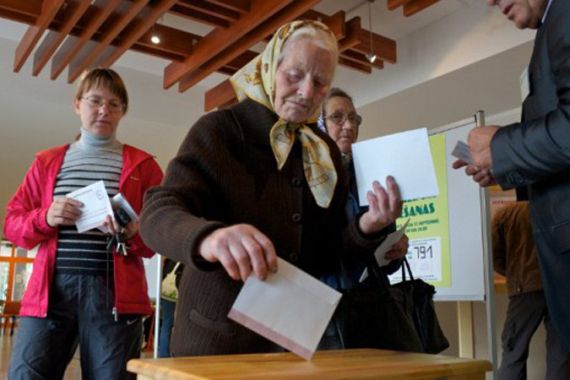Latvians vote in snap parliament poll
Pre-election surveys indicate pro-Russian party could win vote for first time in 20 years.

 |
| Zatlers, leader of the Reform party, would not engage in coalition talks with “oligarch parties” after the vote [AFP] |
Latvians have cast their votes in the country’s snap parliamentary elections, three months after the legislature was dissolved over a corruption crisis.
Exit polls indicate that the Harmony Centre, a pro-Russian party, topped Saturday’s vote with 28.71 per cent but fell short of an outright majority in the EU member nation.
Analysts say Harmony Centre is unlikely to team up with the the new anti-corruption Zatlers Reform Party, led by ex-president Valdis Zatlers, which came second with 20.31 per cent, the Baltic News Service poll showed.
The Unity bloc of incumbent centrist Prime Minister Valdis Dombrovskis ranked third with 19.16 per cent, thus passing the five per cent threshold needed to enter the 100-seat parliament, or Saeima.
Harmony Centre, which draws most of its support from Latvia’s large ethnic Russian minority and was previously the second-largest party in parliament, could muster up to one-third of seats.
Russians make up about 27 per cent of the ex-Soviet state’s 2.2 million population.
Fears of corruption
The snap election was forced by a July referendum at which more than 90 per cent of voters backed a move by Valdis Zatlers, the country’s former president, to dissolve parliament over graft fears.
After losing his bid for re-election in July, Zatlers formed the Reform party, focused on rooting out corruption.
Voting in central Riga on Saturday, Zatlers vowed his party would “not talk” to so-called “oligarch parties” dominated by wealthy businessmen after the election about forming a government.
He was echoed by incumbent Prime Minister Valdis Dombrovskis, in power since March 2009, as he voted in the village of Jaunmarupe near Riga.
“One of the key issues for this parliamentary election is to ensure that those parties that have voted in the oligarchs’ interests in the last parliament will not get a majority in this one, and we think it’s within reach,” Dombrovskis told the AFP news agency, adding he was prepared to continue as prime minister.
Dombrovskis, leader of the Unity party, has won plaudits for steering Latvia out of the world’s deepest recession and back into growth, overseeing an austerity drive under the terms of an international bailout.
Total turnout in last year’s election reached 63 per cent, with a similar level projected before this year’s ballot.
Latvia’s formerly booming economy went bust in 2008 when it sank into a recession that saw the economy shrink by 25 per cent over 2008 and 2009 combined.
The international bailout, paired with deep cuts in public spending, has seen the country emerge from recession, with its economy expect to grow as much as five per cent this year.